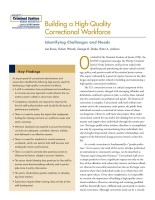| 来源类型 | Research Reports
|
| 规范类型 | 报告
|
| DOI | https://doi.org/10.7249/RR2386
|
| 来源ID | RR-2386-NIJ
|
| Building a High-Quality Correctional Workforce: Identifying Challenges and Needs |
| Joe Russo; Dulani Woods; George B. Drake; Brian A. Jackson
|
| 发表日期 | 2018
|
| 出版年 | 2018
|
| 页码 | 38
|
| 语种 | 英语
|
| 结论 |
Expert panelists discussed the challenges faced by administrators and identified high-priority needs for developing a high-quality correctional workforce- A shift in orientation from punishment and surveillance to a human-services approach could enhance the corrections sector's ability to recruit new talent.
- Competency standards are required to improve the level of staff professionalism and should be the basis of performance evaluation.
- There is a need to assess the impact that inadequate funding for training can have on workforce issues and sector outcomes.
- Minimum standards are required to ensure that training curricula are adequate, consistent, relevant, realistic, and delivered in an effective manner.
- There is a need for standards to control excessive workloads, which can lead to both staff turnover and inadequate mission performance.
- There is a need to promote best practices proven to influence the factors related to turnover intention.
- The sector should develop best practices for line staff to assume more decisionmaking authority and to participate more in policy discussions.
- The sector should place greater emphasis on developing future leaders.
- Supervisors require better training; they are key to line-staff development.
|
| 摘要 |
- Clarify the mission of the sector. A shift in orientation might be key to reversing the long-standing difficulties the sector has faced in recruiting talent to corrections officer positions. Panelists called for research to determine whether a shift toward an increased human-services role, along with a corresponding change in the competencies sought, would help the sector recruit a broader base of new talent.
- Improve staff competencies. The panelists called for the reevaluation of existing competency standards or the creation of new standards for correctional positions.
- Increase staff preparation. The level of funding dedicated to training is insufficient, particularly compared with that in other criminal justice professions. The panelists suggested an assessment of the relationship between funding levels, substandard training, and key outcomes. The panel also identified the need to assess and validate training approaches and to develop national curriculum standards for correctional education.
- Improve the work environment and conditions. Validated workload standards and ratios — and strategies to allow agencies to meet them — are needed to ensure that staff can function in a safe environment with adequate bandwidth and without undue stress. The panel also called for the development of best practices for pushing decisionmaking authority down to the lowest possible levels.
- Develop future leaders. The panel recommended the creation and promotion of best practices for leadership development and recommended assessments of the adequacy of training for new supervisors, development of strategies for improvement, and compilation of best practices for leadership development.
|
| 主题 | Corrections
; Employment and Unemployment
; Workforce Management
|
| URL | https://www.rand.org/pubs/research_reports/RR2386.html
|
| 来源智库 | RAND Corporation (United States)
|
| 引用统计 |
|
| 资源类型 | 智库出版物
|
| 条目标识符 | http://119.78.100.153/handle/2XGU8XDN/108876
|
推荐引用方式
GB/T 7714 |
Joe Russo,Dulani Woods,George B. Drake,et al. Building a High-Quality Correctional Workforce: Identifying Challenges and Needs. 2018.
|
|
文件名:
|
x1540239299844.jpg
|
|
格式:
|
JPEG
|

|
文件名:
|
RAND_RR2386.pdf
|
|
格式:
|
Adobe PDF
|
除非特别说明,本系统中所有内容都受版权保护,并保留所有权利。